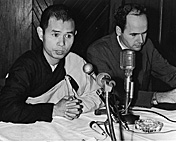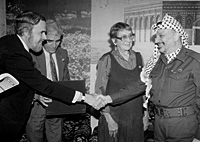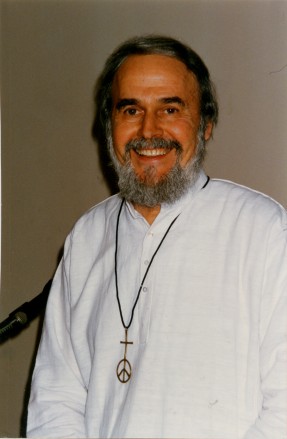
May / June 2005
Featured Story
Living in an Extraordinary Time
By Rabia
Harris
With this issue, Richard Deats is retiring as editor-in-chief of
Fellowship. Rabia Harris, interim editor, invited him to reflect on his
long career.
  
Harris: You are practically an institution at FOR. Just how long
have you been here, anyway?
Deats: I joined FOR on January 1, 1953 when I was a student at
McMurry University in Abilene, Texas. Muriel Lester, traveling secretary
of the International FOR, had visited the campus during a time when the
Cold War and the blacklisting by Senator Joseph McCarthy of supposed
Communists had heightened the fears and paranoia of the country. Muriel
spoke twice on campus—once on the world situation in the light of the
Sermon on the Mount, and once on prayer. The combination of the inward
journey and the outward journey she presented had an enormous impact on
me, and I decided to join the FOR. I was an active member from that time
on, as I became involved in peace and civil rights issues.
During the Vietnam war I was teaching at Union Theological Seminary in
the Philippines and was part of antiwar activities in Southeast Asia,
especially through FOR’s International Committee of Conscience on
Vietnam. Out of that involvement, FOR invited me to join the staff in
Nyack, New York. I did so in 1972. So I’ve been a staff member for
thirty-three years, as director of interfaith activities, as executive
secretary, and as editor of Fellowship magazine. That’s a long time—but
not a record. John Nevin Sayre was on staff for fifty-two years!
Harris: How did you first get
interested in nonviolence?
Deats: It goes back a long ways. As a child I was deeply
impressed in Sunday school by a picture on the wall of Jesus surrounded
by children representing the different races and nationalities of the
world. This, along with the church school teachings of overcoming evil
with good, of being a peacemaker and loving even your enemy, made me
aware of the nonviolence that permeates the teachings of Jesus.
I also learned, in that Methodist Sunday school in Big Spring, Texas,
that segregation and the racism that gave rise to it were a
contradiction of Jesus’ teachings. I would later come to see war as
another contradiction that should be opposed.
Along with my church’s teaching were the wider stirrings that were
taking place in the world. The Gandhian movement in India and the
spreading civil rights efforts in this country began to demonstrate the
practical application of nonviolence. Commitment to peace was not just
saying No (although that was important); it also led to nonviolent
action for justice and peace.
There are many who say that “the Gospel is more than the Sermon on the
Mount.” I agree—but what I have observed are Christian teaching and
practice that are a good deal less than the Sermon on the Mount. I’ve
never been convinced by those who march at the call of the nation to
slaughter the enemy and lay waste their cities and countryside. At FOR
I’ve met pacifists from Jewish, Muslim, Hindu, and Buddhist traditions,
and I have discovered I had far more in common with them than with
Christian apologists for war. As we find in I John 4:
Let us love one another; for love is of God, and everyone that loves is
born of God, and knows God. He who does not love does not know God, for God
is love…. If we love one another, God abides in us and His love is perfected
in us.
Dr. King spoke of this kind of love as “the key that unlocks the door
which leads to ultimate reality.” I see this in the witness of persons
like Gandhi and King, Muriel Lester and Abdul Ghaffar Khan, Desmond Tutu
and Dorothy Day, Thich Nhat Hanh and Abraham Joshua Heschel, James
Lawson and Hildegard Goss-Mayr.
Harris: What would you consider to be
the highlights of your career?
Deats: What a privilege and challenge it has been to live in an
era when nonviolence—“as old as the hills,” as Gandhi said—has spread
across the world, influencing the destiny of individuals, nations, and
peoples to overcome injustice and oppression nonviolently.
Certainly a highlight I look back upon is having been involved in the
civil rights movement and having seen the end of Jim Crow, and then
working with Coretta Scott King and serving on the Martin Luther King,
Jr. Federal Holiday Commission. It was gratifying to be in the Rose
Garden when President Reagan signed the bill making Dr. King’s birthday
a national holiday. Reagan’s initial opposition to that bill was
overcome by a determined movement all over the country—a lesson to
remember.
From the mid-1970s on, I began leading workshops around the world in
revolutionary and/or oppressive situations. One such was a trip to South
Korea at the time of the Park dictatorship. Though I was followed by the
Korean CIA through most of my visit, my hosts arranged for me to do
unannounced nonviolence trainings and speak to various audiences. It was
on that trip that I met with the Korean Gandhi, Quaker Ham Sok Hohn.
Having left the Philippines during the Marcos dictatorship, I was
invited back to help with the work Jean and Hildegard Goss-Mayr had started in aiding the nonviolent resistance
movement against Marcos. Accompanied by Stefan Merken and a group of
Union Seminary students and their faculty adviser, Hilario Gomez (a
former student of mine who later became a bishop of the United Church of
Christ in the Philippines), we met with groups throughout the island of
Luzon. These efforts contributed to the People Power movement that
nonviolently overthrew the Marcos government in 1986 and inspired
nonviolent movements in Burma, China, Chile, and other places.
Hildegard Goss-Mayr had started in aiding the nonviolent resistance
movement against Marcos. Accompanied by Stefan Merken and a group of
Union Seminary students and their faculty adviser, Hilario Gomez (a
former student of mine who later became a bishop of the United Church of
Christ in the Philippines), we met with groups throughout the island of
Luzon. These efforts contributed to the People Power movement that
nonviolently overthrew the Marcos government in 1986 and inspired
nonviolent movements in Burma, China, Chile, and other places.
Hildegard and I subsequently facilitated workshops in Hong Kong and
South Korea, as well as participating (with Jean Goss) in similar
efforts in Bangladesh, and in the first nonviolence conference in the
Soviet Union. This led to my taking FOR delegations back to Moscow and
to Lithuania for the first nonviolence trainings in both places.
Also memorable were many trips to the Soviet Union and Eastern Europe,
journeys of reconciliation in places where many had thought war between
the communist world and the capitalist world was inevitable. The fright
in those early trips changed increasingly to anticipation as grassroots
diplomacy began to build up an almost irresistible tide of friendship
between East and West. As we began to be able to bring Soviet citizens
to this country, we found barriers melting and hopes for peace soaring.
We lived the truth of what President Eisenhower had said: “Someday the
people are going to want peace so much that governments are going to
have to get out of the way and let them have it.”
While the PLO was based in Tunis, it issued an invitation to FOR. Gene
Hoffman, Scott Kennedy, Karim Alkadhi and I spent five days there and
got to talk seriously with Yassir Arafat about the growing worldwide
relevance of revolutionary nonviolence. Subsequent trips to Israel and
Palestine have sought to continue this dialogue.
Certainly another highlight was the invitation of the South Africa
Council of Churches to Walter Wink and me to visit that country in 1987
and hold workshops with anti-apartheid activists. Coming at the time of
a state of emergency called by the government, it was a moment of great
difficulty for the movement there. But their determination was to lead
to the collapse of the apartheid government’s racist policies.
Harris: Of the many situations with
which you have been involved, which were most challenging? Which
subjected your ideals to the most difficult tests?
Deats: I’d have to say that what has been most difficult and
challenging over the years has been not only the reluctance but the
opposition of the institutional church to the radical nature of Jesus’
message of love even for the enemy. To always be a minority voice is an
ongoing test of one’s commitment.
On a biblical, theological, and historical level, of course, this
opposition is not surprising. Religious institutions sink their roots
deep in the culture and come to identify with “the principalities and
powers.” Any challenge to the status quo is seen not only as disloyal
but as probably heretical.
Harris: How do you see the evolution
of FOR over the years? Is it the same as it was when you started, or has
it become different, and if so, how?
Deats: First, the earliest opposition to war was principally
saying No. The refusal to kill or to sanction hatred and violence
were—and remain—indispensable to our message. But over the course of the
20th century, nonviolence became more and more central in our
understanding of how you actually live out the pacifist commitment. The
great impetus for this was the Gandhian movement, first in South Africa,
then in India.
Gandhi experimented with nonviolence as a way of life and a strategy
for change. This “experiment with Truth” as he called it has come to
have an enormous impact all over the world as individuals and groups
have struggled to overcome injustice and oppression and to build what
Martin Luther King, Jr. called “the beloved community.” FOR has been
fundamentally influenced by Gandhi’s experiments. Our current emphasis
on nonviolence training grows out of this.
Secondly, I think a major development has been FOR’s having become an
interfaith organization. Over the years and through many campaigns, FOR
discovered nonviolent traditions in other faiths producing other
peacemakers who shared its (initially Christian) opposition to war and
violence. This led to FOR’s current mission statement, which says, “The
Fellowship of Reconciliation seeks to replace violence, war, racism, and
economic injustice with nonviolence, peace, and justice. We are an
interfaith organization committed to active nonviolence as a
transforming way of life and as a means of radical change. We educate,
train, build coalitions, and engage in nonviolent and compassionate
actions locally, nationally, and globally.” Rather than watering down
faith and seeking the lowest common denominator, we have made an effort
to work for peace out of the deepest impulses and insights of each faith
tradition.
Thirdly, out of years of efforts to overcome the limits of leadership
that was predominantly white, male, and heterosexual, we have made
headway—but still have far to go—in developing a much more diverse
staff, council, and membership in the FOR.
Harris: How have your own views
changed?
Deats: Working with, and getting to know, people of other faith
traditions is an ongoing challenge, both humbling and bracing. While
still deeply committed to Jesus Christ, I have learned so much, and
continue to learn much, from those on a different faith journey. In such
a diverse world, can we do otherwise?
I think another major change has been a heightened awareness of the
environmental crisis. While this is not new, the urgency is now
inescapably upon us. Opposition to global warming in not just an option,
but a necessity. The peace and environmental movements should be much
more consciously allied in protecting the earth and humanity from the
violent direction of US foreign and domestic policies. Our current
situation is best described by Dietrich Bonhoffer’s image of being on a
train heading toward Hell.
Harris: Many people feel that to live
in accordance with an ideal requires personal sacrifice. How has your
lifetime commitment to nonviolence affected your private life?
Deats: I often think of an American nurse in Asia who was
working in a leprosarium. A visitor said to her, “I wouldn’t do this for
a million dollars.”
“Neither would I,” said the nurse.
In our money-driven society, many people link fulfillment to income.
But I cannot think of a more fulfilling life than having the privilege
of working for a nonviolent future. To get paid for that—even if it
isn’t very much!—is incomparable.
I am blessed in the fact that my wife Jan’s great commitment to music
is every bit as consuming as is my commitment to peace. Our challenge is
to keep our relationship strong in the midst of our vocational callings.
Harris: What has been most fun?
Deats: Gandhi said, “If I didn’t have a sense of humor I would
long ago have committed suicide.” I have found that one of the
characteristics of many social change movements is their sense of humor
and of finding joy even in the midst of appalling situations. I have
seen this especially in the civil rights movement and in the movements
in South Africa and the Philippines.
Cardinal Jaime Sin was head of the Catholic Church in the Philippines
during the Marcos dictatorship. The cardinal’s finally turning against
the dictatorship was of enormous importance in the People Power
movement, leading to the joke that the reason Marcos was defeated was
that he was “without Sin.” Others said, “Marcos had the guns but Cory
Aquino had the nuns.”
When the apartheid government sprayed
purple water on demonstrators in Capetown, Tutu and others found a new
motto: “The purple shall govern!” At a rally in Philadelphia,
Mississippi following the brutal killing of Goodman, Cheyney, and
Schwerner, King called on Abernathy to pray before a crowd of hostile
whites that included the local sheriff. Afterwards someone asked King
why he didn’t lead the prayer. “In that crowd, I wasn’t about to close
my eyes!” said King, to the guffaws of his friends, who were accustomed
to the humorous banter that pervaded the movement.
This is why I wrote the book How to Keep Laughing Even Though You’ve
Considered All the Facts. I thought it would be an encouragement to
people struggling against enormous odds to make this a better world. As
Texan Molly Ivins reminds us, “So keep fightin’ for freedom and justice,
beloveds, but don’t you forget to have fun doin’ it. ‘Cause you don’t
always win. Be outrageous, ridicule the fraidy-cats, rejoice in all the
oddities that freedom can produce. And when you get through kickin’ ass
and celebratin’ the sheer joy of a good fight, be sure to tell those who
come after how much fun it was.”
Harris: What is your take on the
world situation? Are you hopeful in the short run, or only in the long
run?
Deats: That’s really a tough question. To look at current
policies is to wonder if human beings have a death wish. Our assault on
the earth for short-term financial gain remains thoroughly in the saddle
in this country. Decades of important environmental achievements are
being undone by the Bush administration and its policies favoring the
richest and most predatory segments of our country. Rather than throwing
his disgraceful presidency out of office, voters were swayed by lies, by
smoke and mirrors, returning him to another four-year term.
I am reminded of the words of Joan of Arc in George Bernard Shaw’s
play St. Joan. “Some people see things as they are and ask ‘Why?’ I
dream of things that never were and ask ‘Why not?’”
Harris: What do you see as the next
steps in your life’s journey?
Deats: Well, I am in good health and still full of dreams and
energy and hope. Jan and I will continue to live in Nyack near three of
our four children and their children—as well as our first
great-grandchild.
In the immediate future I want to go through my journals and projects
and do some writing, including a few more books perhaps. I look forward
to gardening and playing the clarinet in a concert band. And I’ll be
open to some speaking and preaching, as well as perhaps a peace project
or two.
Harris: Is there anything you’d
particularly like to tell our readers?
Deats: The poet Adrienne Rich wrote, “I have to cast my lot
with those who, age after age, perversely, with no extraordinary power,
reconstitute the world.” I think of our readers and members of the
Fellowship of Reconciliation as part of this saving remnant who, in
season and out, witness to the power of truth and love to overcome all
falsehood and hatred and, in so doing, reconstitute the world.
Back to home page
|




 Hildegard Goss-Mayr had started in aiding the nonviolent resistance
movement against Marcos. Accompanied by Stefan Merken and a group of
Union Seminary students and their faculty adviser, Hilario Gomez (a
former student of mine who later became a bishop of the United Church of
Christ in the Philippines), we met with groups throughout the island of
Luzon. These efforts contributed to the People Power movement that
nonviolently overthrew the Marcos government in 1986 and inspired
nonviolent movements in Burma, China, Chile, and other places.
Hildegard Goss-Mayr had started in aiding the nonviolent resistance
movement against Marcos. Accompanied by Stefan Merken and a group of
Union Seminary students and their faculty adviser, Hilario Gomez (a
former student of mine who later became a bishop of the United Church of
Christ in the Philippines), we met with groups throughout the island of
Luzon. These efforts contributed to the People Power movement that
nonviolently overthrew the Marcos government in 1986 and inspired
nonviolent movements in Burma, China, Chile, and other places.